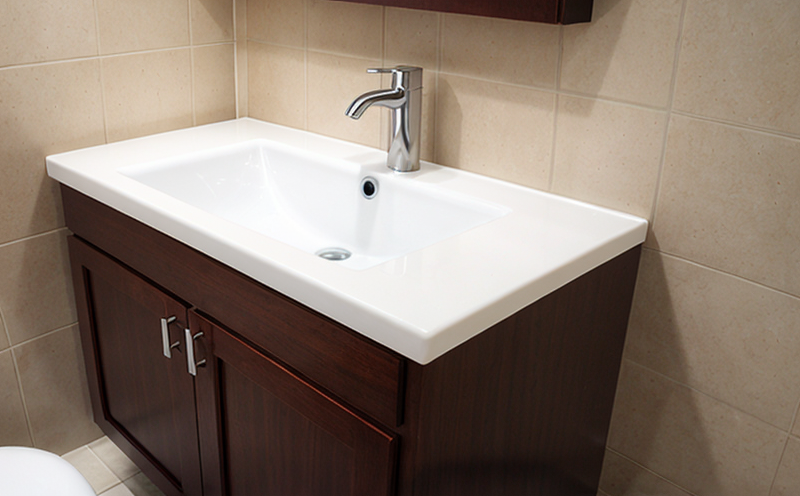BS EN 14688 Hygiene Testing of Plastic Sanitary Fixtures
The BS EN 14688 standard specifies the requirements for ensuring that plastic sanitary fixtures comply with hygiene standards. This testing is crucial to prevent the spread of pathogens and ensure public health in environments where hygiene is paramount, such as bathrooms and other sanitary facilities.
Plastic materials used in sanitary fixtures must meet stringent criteria to guarantee their safety and effectiveness. The standard covers a wide range of parameters that are critical for evaluating the hygienic performance of these products. These include microbiological testing, chemical resistance tests, durability assessments, and more.
The testing process involves several stages. Initially, specimens of the plastic sanitary fixtures are prepared according to specific guidelines laid down in the standard. This preparation ensures that all parts of the fixture are tested accurately and comprehensively. Following this, microbiological growth experiments are conducted under controlled conditions. These tests are designed to assess how effectively the materials prevent bacterial contamination.
The chemical resistance tests aim to determine if the plastic materials can withstand exposure to a variety of chemicals commonly found in cleaning agents used in sanitary facilities. This is important because it ensures that the materials do not leach harmful substances into water or air, which could pose risks to users' health and safety.
Durability assessments are conducted to evaluate the long-term performance and reliability of the plastic fixtures. These tests simulate real-world usage conditions to ensure that the products maintain their hygienic properties over time. Additionally, mechanical strength testing is performed to confirm that the materials can withstand the forces they will encounter during use.
The results of these tests are meticulously documented in a comprehensive report. This document serves as evidence that the plastic sanitary fixtures meet all specified requirements under BS EN 14688. It provides quality managers, compliance officers, and R&D engineers with crucial insights into the performance and safety of their products.
By adhering to this standard, manufacturers ensure that their products are not only functional but also safe for use in public environments. This commitment to hygiene is vital given the increasing awareness about health and sanitation issues globally. Ensuring compliance with BS EN 14688 helps establish trust among consumers and regulatory bodies alike.
- Microbiological growth experiments
- Chemical resistance tests
- Durability assessments
- Mechanical strength testing
Industry Applications
The BS EN 14688 standard is widely applicable across various sectors, particularly in the bathroom and sanitary fixture industries. It ensures that all plastic materials used in these fixtures meet strict hygiene standards, which is essential for maintaining public health.
This testing is crucial not only in manufacturing but also during quality assurance processes at every stage of production. By adhering to this standard, manufacturers can ensure their products are safe and effective in preventing the spread of pathogens. This is especially important given the increasing focus on hygiene and sanitation in modern facilities.
The results of BS EN 14688 testing provide valuable insights for quality managers, compliance officers, and R&D engineers. These professionals can use this information to improve product design and manufacturing processes, ensuring that every aspect of the fixture contributes to maintaining high levels of hygiene.
Compliance with this standard is particularly important in environments where public health is a primary concern, such as hospitals, schools, and commercial buildings. Ensuring that plastic sanitary fixtures meet these rigorous standards helps create safer spaces for everyone who uses them.
Customer Impact and Satisfaction
The implementation of BS EN 14688 hygiene testing has a direct impact on customer satisfaction and trust in the products. Customers expect sanitary fixtures to be safe, hygienic, and durable. Compliance with this standard ensures that they receive exactly what they need.
For quality managers and compliance officers, ensuring adherence to BS EN 14688 is a key component of their responsibilities. It helps them maintain high standards throughout the production process, from raw material selection to final product delivery. This commitment to hygiene not only meets regulatory requirements but also enhances customer confidence.
R&D engineers benefit greatly from this testing as well. They can leverage the data generated during these tests to innovate and improve their products continuously. By staying ahead of industry trends and challenges, they ensure that their innovations contribute positively towards maintaining high levels of hygiene in public spaces.
Ultimately, compliance with BS EN 14688 helps build a positive reputation for manufacturers. It demonstrates a commitment to excellence in product development and production, which is vital in today’s competitive market. This reputation translates into higher customer satisfaction and loyalty, fostering long-term relationships between customers and suppliers.
Use Cases and Application Examples
- Bathroom fixtures like toilets, urinals, and sinks
- Public lavatories in schools and hospitals
- Cleanrooms used for manufacturing sensitive products
- Commercial office buildings with shared sanitation facilities
In each of these applications, the BS EN 14688 standard plays a vital role. It ensures that plastic sanitary fixtures are not only functional but also safe and hygienic, contributing significantly to public health.
For instance, in hospitals, where hygiene standards are exceptionally high due to the presence of vulnerable populations, ensuring compliance with this standard is essential. In schools and commercial buildings, maintaining a clean environment is crucial for both staff and visitors. Cleanrooms require particularly stringent hygiene measures to prevent contamination during manufacturing processes.
The use cases span various environments where public health is paramount. By adhering to BS EN 14688, manufacturers can ensure that their products meet the highest standards of hygiene, thereby contributing positively towards maintaining safe and healthy spaces for everyone.





